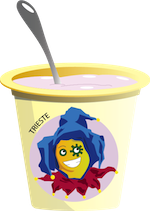Team:Trieste/project
From 2012.igem.org
(fix minor errors) |
Corsogiulia (Talk | contribs) |
||
| (8 intermediate revisions not shown) | |||
| Line 9: | Line 9: | ||
<div id="box_main"> <!-- start box_main --> | <div id="box_main"> <!-- start box_main --> | ||
<div class="box_contenuti"> | <div class="box_contenuti"> | ||
| - | < | + | <h2>Background</h2> |
<p class="fancy"> | <p class="fancy"> | ||
Recent studies have evidenced that the intestinal microflora can | Recent studies have evidenced that the intestinal microflora can | ||
| Line 17: | Line 17: | ||
is therefore believed that having a beneficial and healthy intestinal | is therefore believed that having a beneficial and healthy intestinal | ||
microflora is very important for human health. | microflora is very important for human health. | ||
| + | </br> | ||
| + | </br> | ||
</p> | </p> | ||
| - | < | + | <h2>Project</h2> |
<p class="fancy"> | <p class="fancy"> | ||
Our aim is to modify a bacteria normally found in human gut and create | Our aim is to modify a bacteria normally found in human gut and create | ||
| Line 26: | Line 28: | ||
</p> | </p> | ||
<p class="fancy"> | <p class="fancy"> | ||
| - | For this purpose we have chosen the E. coli strain Nissle 1917 which has been | + | For this purpose we have chosen the <i>E. coli </i> strain Nissle 1917 which has been |
used for many years as a probiotic. We designed a robust gene guard system | used for many years as a probiotic. We designed a robust gene guard system | ||
regulated by a novel and easy to control inducible switch that activates | regulated by a novel and easy to control inducible switch that activates | ||
| Line 43: | Line 45: | ||
because the receiving bacteria do not produce the CymR repressor needed to | because the receiving bacteria do not produce the CymR repressor needed to | ||
repress the expression of the antimicrobial peptide. | repress the expression of the antimicrobial peptide. | ||
| + | </br> | ||
| + | </br> | ||
</p> | </p> | ||
| - | < | + | <h2>Application</h2> |
<p class="fancy"> | <p class="fancy"> | ||
The safe probiotic constructed here can be used to produce nutritious, | The safe probiotic constructed here can be used to produce nutritious, | ||
| Line 57: | Line 61: | ||
<div id="box_right"> <!-- start box_right --> | <div id="box_right"> <!-- start box_right --> | ||
<ul id="sub_menu"> | <ul id="sub_menu"> | ||
| - | <li><a href="https://2012.igem.org/Team:Trieste/project">Abstract</a></li> | + | <li class="select" ><a href="https://2012.igem.org/Team:Trieste/project">Abstract</a></li> |
<li><a href="https://2012.igem.org/Team:Trieste/project/overview">Project Overview</a></li> | <li><a href="https://2012.igem.org/Team:Trieste/project/overview">Project Overview</a></li> | ||
<li><a href="https://2012.igem.org/Team:Trieste/project/applications">Applications</a></li> | <li><a href="https://2012.igem.org/Team:Trieste/project/applications">Applications</a></li> | ||
| - | + | <li><a href="https://2012.igem.org/Team:Trieste/project/modeling">Modeling</a></li> | |
| + | <li><a href="https://2012.igem.org/Team:Trieste/project/mainres">Main Results</a></li> | ||
| + | </ul> | ||
<img src="https://static.igem.org/mediawiki/2012/b/b0/Team_trieste.jpg" alt="Team iGEM 2012" id="igem_team" /> | <img src="https://static.igem.org/mediawiki/2012/b/b0/Team_trieste.jpg" alt="Team iGEM 2012" id="igem_team" /> | ||
<div class="box_contacts"> | <div class="box_contacts"> | ||
| Line 69: | Line 75: | ||
Follow us also: | Follow us also: | ||
<a href="https://www.facebook.com/IGEMUNITS?ref=ts" target="_blank"><img src="https://static.igem.org/mediawiki/2012/f/f4/Ico_fb.png" alt="Facebook" class="fb" /></a> | <a href="https://www.facebook.com/IGEMUNITS?ref=ts" target="_blank"><img src="https://static.igem.org/mediawiki/2012/f/f4/Ico_fb.png" alt="Facebook" class="fb" /></a> | ||
| - | <a href="https://twitter.com/ | + | <a href="https://twitter.com/iGEMTrieste" target="_blank"><img src="https://static.igem.org/mediawiki/2012/2/21/Ico_twitter.png" alt="twitter" class="tw" /></a> |
</div> | </div> | ||
</div> | </div> | ||
Latest revision as of 01:30, 27 September 2012
Abstract
More
Background
Recent studies have evidenced that the intestinal microflora can actually be considered an organ of the body. It has several functions in the human gut, mostly metabolic and immunologic, and it constantly interacts with the intestinal mucosa in a delicate equilibrium. It is therefore believed that having a beneficial and healthy intestinal microflora is very important for human health.
Project
Our aim is to modify a bacteria normally found in human gut and create a safe, controllable and versatile molecular platform which can be used to produce a wide range of molecules (as for example other antibodies or enzymes) leading to a beneficial probiotic.
For this purpose we have chosen the E. coli strain Nissle 1917 which has been used for many years as a probiotic. We designed a robust gene guard system regulated by a novel and easy to control inducible switch that activates the production of a human antimicrobial peptide that can kill the bacteria and also avoid horizontal transfer.
Our gene guard system is based on the cumate molecule present in the common spice: cumin. In absence of this molecule our system produces a repressor (CymR) which inhibits the expression of an antimicrobial peptide. When administered and therefore present in human intestine, cumin recognizes and disables the CymR repressor resulting in the production of the antimicrobial peptide cathelicidin LL-37 which causes bacterial death. In case of plasmid transfer into other bacteria of the plasmid carrying the expression system, the expression of the antimicrobial peptide will be activated immediately because the receiving bacteria do not produce the CymR repressor needed to repress the expression of the antimicrobial peptide.
Application
The safe probiotic constructed here can be used to produce nutritious, preventive or therapeutic molecules. For example, we have used it to produce an antibody against the emerging virus called Norovirus; this virus which has a dramatic spreading speed: rates of reported Norovirus outbreaks reach 21 million cases of acute gastroenteritis per year, 70.000 of those need hospitalization and 800 die.







 "
"









